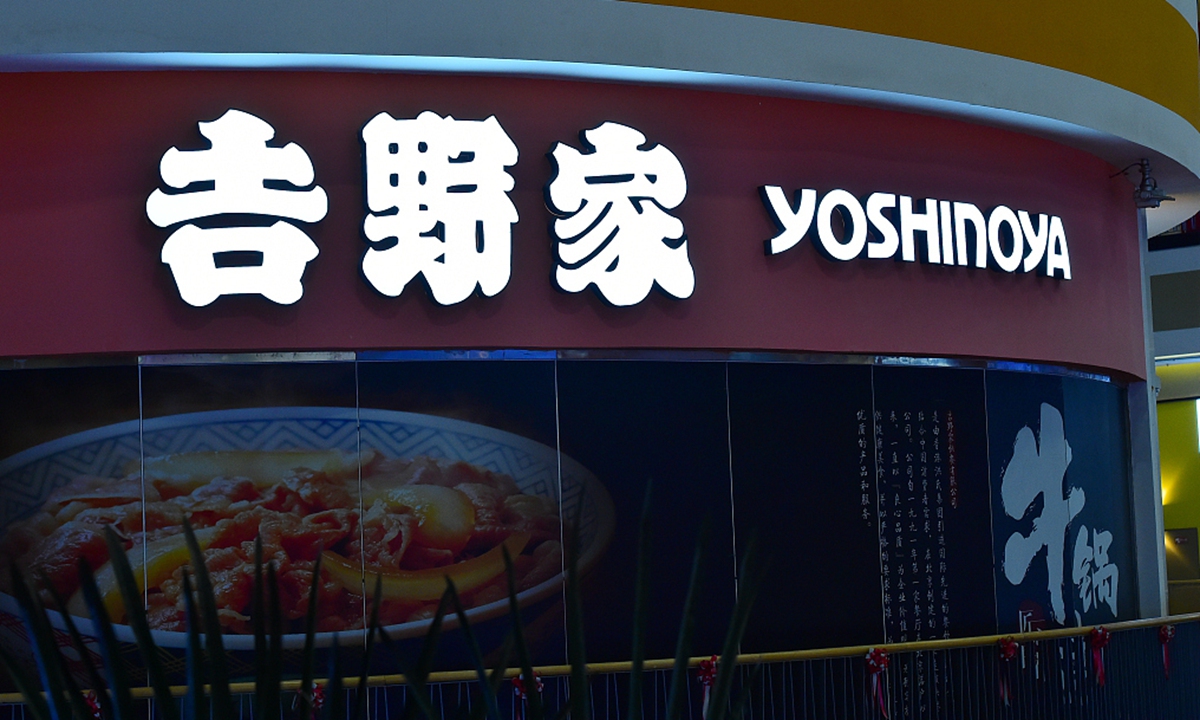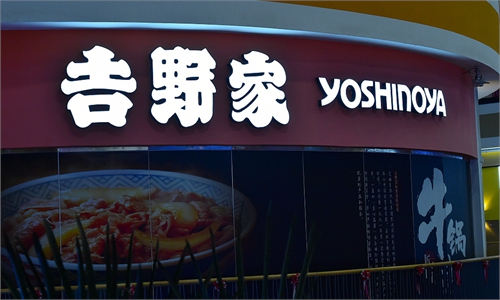
A Yoshinoya restaurant in Shenyang, Northeast China's Liaoning Province Photo: VCG
Yoshinoya China apologized on Tuesday after a blogger disclosed the Japanese restaurant chain served customers expired food, raising public outcry over food safety concerns posed by the company, which has made China its largest market in the world after 29 years in business.
Industry analysts warned that Yoshinoya is failing the trust of Chinese customers and hope the recent case will serve as a warning to the company not to abuse the confidence it has built or will lose the Chinese market.
In response to issues such as the use of expired ingredients and spoiled meat exposed by the blogger, Yoshinoya issued a statement of apology on its official website stating that the store involved has been closed for rectification.
The news jumped to the second place of the top hot search list on China's social media platform Sina Weibo on Wednesday evening with up to 50 million views and tens of thousands of comments.
A blogger named Neimujiuchaju posted a short video on Monday, disclosing the shocking discovery of serious food safety issues during a visit at a Yoshinoya restaurant in East China's Anhui Province. The video immediately drew huge public attention and condemnation over the company.
Yoshinoya claims it serves customers the freshest food with the highest quality, for "the best beef rice." In reality, freshness is not always guaranteed and ingredients like cabbage and spinach continue to be used after they expired, Neimujiuchaju said.
The food was so expired that the meat used to make Mapo Tofu had become smelly and sour and there were no test standards for oil either, with old oil mixed with new oil, the blogger noted, adding that kitchen hygiene was also worrying.
The video itself had up to 2,700 comments and 18,000 likes as of Wednesday evening.
The Japanese restaurant chain said that they have noticed the video and the attention it has drawn.
"Yoshinoya attaches great importance to it and deeply apologizes over the matter," the statement from the restaurant chain said.
The company has temporarily closed the restaurant involved in the case and established a special food quality team for investigation. The company also pledged to launch quality checks to all the restaurants in China.
While extending its appreciation to the supervision from netizens, the company promised to intensify education and training of product quality and procedures at stores.
The company has also received a call for a meeting from the market regulator after the case.
The company's statement has not received a positive response from netizens. Many do not accept its apology.
"Is this just an apology?" one netizen questioned.
"They must think it is easy to make money out of the Chinese people," another netizen said. Her comment received up to 600 likes.
This is not the first time that food safety issues were found at the food chain.
As early as 2013, some Yoshinoya restaurants in Beijing were made to go through a rectification after the cases such as reusing tableware, selling expired rice, and employees without a health certificate were disclosed.
In 2020, Yoshinoya closed 150 stores worldwide due to the global pandemic, according to its financial report in April.
However, its consumer base in China remained strong. Currently, the company has more than 1,000 restaurants worldwide with over 60 percent of them located in China, according to media reports.
What happened with Yoshinoya serves as a reminder that it does not matter if a company is Chinese or foreign, it will be treated as equal in the Chinese market and no one can bypass the rules, Hong Tao, Director of the Institute of Business Economics at the Beijing Technology and Business University, told the Global Times.
China's food safety rates have been increasing year-on-year, with last year reaching up to 99 percent, Hong said. "But the rest 1 percent could mean 100 percent for any consumer, which is why zero-tolerance must be applied in market administration," he remarked.
"The recent case also sends a clear warning to Yoshinoya not to abuse the trust of Chinese consumers or they will lose the Chinese market," Hong said.

